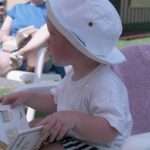Disappearing Years
Driving towards the North Riding of Co Tipperary in the last light of a spring evening, on RTE Radio there was a broadcast of a 2007 interview with the writer Pearse Hutchinson who died in January.
Hutchinson recalls the delight he took in his childhood years in the Dinky cars which he would race around the perimeter of the carpet in his Dublin home. Until one day, he picked up the cars feeling that his childhood must end. He spoke of a feeling of bleak desolation; a sense of a profound loss.
It is that moment evoked by A. A. Milne in the closing paragraphs of ‘The House at Pooh Corner’. Christopher Robin is going away to school; his days of doing Nothing with his cuddly toys Winnie the Pooh, Piglet and the rest – are at an end. He begs Pooh not to forget him – but we know that childish things are being put away. There is sense of childhood’s fleetingness as sad as Hutchinson’s feelings as he gathers up his beloved cars for the last time.
Pooh and Piglet and Tigger and Eeyore were companions on our journeys when our undergraduate children were small. Alan Bennett’s reading of their adventures would be played again and again until every expression and intonation was embedded in the memory. The red balloon story can still be rehearsed at meal tables. A nine year old son sitting between the pillow at the head of his parents’ bed early on an August morning singing, Pooh-like, ‘Tiddly pom,pom, pom’ and suggesting that this might be a song one might sing on a morning when one was going on holiday, is a memory that will remain as long as memory remains.
We have two copies of ‘The House at Pooh Corner’. Two copies are necessary: sometimes clergy have been know to borrow books and not return them.
The anguish of Christopher Robin as he tries to explain his going away and the incomprehension of poor Pooh are beautifully human and bring tears to the eyes of a sentimental cleric:
‘Then, suddenly again, Christopher Robin, who was still looking at the world with his chin in his hands, called out “Pooh!”
“Yes?” said Pooh.
“When I’m – when – Pooh!”
“Yes, Christopher Robin?”
“I’m not going to do Nothing any more.”
“Never again?”
“Well, not so much. They don’t let you.”
Pooh waited for him to go on, but he was silent again.
“Yes, Christopher Robin?” said Pooh helpfully.
“Pooh, when I’m – you know – when I’m not doing Nothing, will you come up here sometimes?”
“Just Me?”
“Yes, Pooh.”
“Will you be here too?”
“Yes, Pooh, I will be really. I promise I will be, Pooh.”
“That’s good,” said Pooh.
“Pooh, promise you won’t forget about me, ever. Not even when I’m a hundred.”
Pooh thought for a little.
“How old shall I be then?”
“Ninety-nine.”
Pooh nodded.
“I promise,” he said.
Still with his eyes on the world Christopher Robin put out a hand and felt for Pooh’s paw.
“Pooh,” said Christopher Robin earnestly, “if I – if I’m not quite” he stopped and tried again – “. Pooh, whatever happens, you will understand, won’t you?”
“Understand what?”
“Oh, nothing.” He laughed and jumped to his feet. “Come on!”
“Where?” said Pooh.
“Anywhere,” said Christopher Robin.
* * * * *
So they went off together. But wherever they go, and whatever happens to them on the way, in that enchanted place on the top of the Forest a little boy and his Bear will always be playing.



Oh
: ‘ /